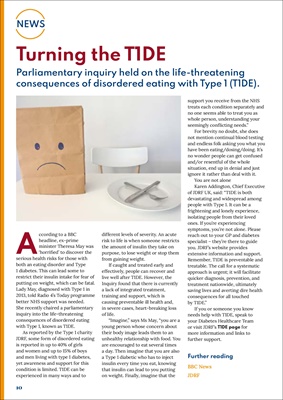
10
NEWS
Turning the T1DE
Parliamentary inquiry held on the life-threatening
consequences of disordered eating with Type 1 (T1DE).
According to a BBC
headline, ex-prime
minister Theresa May was
'horrified' to discover the
serious health risks for those with
both an eating disorder and Type
1 diabetes. This can lead some to
restrict their insulin intake for fear of
putting on weight, which can be fatal.
Lady May, diagnosed with Type 1 in
2013, told Radio 4's Today programme
better NHS support was needed.
She recently chaired a parliamentary
inquiry into the life-threatening
consequences of disordered eating
with Type 1, known as T1DE.
As reported by the Type 1 charity
JDRF, some form of disordered eating
is reported in up to 40% of girls
and women and up to 15% of boys
and men living with type 1 diabetes,
yet awareness and support for this
condition is limited. T1DE can be
experienced in many ways and to
different levels of severity. An acute
risk to life is when someone restricts
the amount of insulin they take on
purpose, to lose weight or stop them
from gaining weight.
If caught and treated early and
effectively, people can recover and
live well after T1DE. However, the
Inquiry found that there is currently
a lack of integrated treatment,
training and support, which is
causing preventable ill health and,
in severe cases, heart-breaking loss
of life.
"Imagine," says Ms May, "you are a
young person whose concern about
their body image leads them to an
unhealthy relationship with food. You
are encouraged to eat several times
a day. Then imagine that you are also
a Type 1 diabetic who has to inject
insulin every time you eat, knowing
that insulin can lead to you putting
on weight. Finally, imagine that the
support you receive from the NHS
treats each condition separately and
no one seems able to treat you as
whole person, understanding your
seemingly conflicting needs."
For brevity no doubt, she does
not mention continual blood testing
and endless folk asking you what you
have been eating/dosing/doing. It's
no wonder people can get confused
and/or resentful of the whole
situation, end up in denial and just
ignore it rather than deal with it.
You are not alone
Karen Addington, Chief Executive
of JDRF UK, said: "T1DE is both
devastating and widespread among
people with Type 1. It can be a
frightening and lonely experience,
isolating people from their loved
ones. If you're experiencing
symptoms, you're not alone. Please
reach out to your GP and diabetes
specialist - they're there to guide
you. JDRF's website provides
extensive information and support.
Remember, T1DE is preventable and
treatable. The call for a systematic
approach is urgent; it will facilitate
quicker diagnosis, prevention, and
treatment nationwide, ultimately
saving lives and averting dire health
consequences for all touched
by T1DE."
If you or someone you know
needs help with T1DE, speak to
your Diabetes Healthcare Team
or visit JDRF's T1DE page for
more information and links to
further support.
Further reading
BBC News
JDRF